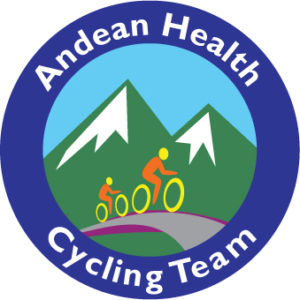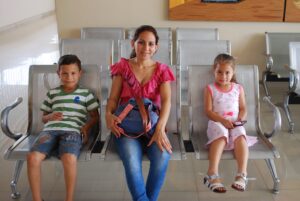
2024 Winter News
As you put together your complex holiday menu on a chilly winter day, I would like to share with you another complexity we face beyond the already challenging landscape of health care delivery: energy shortage.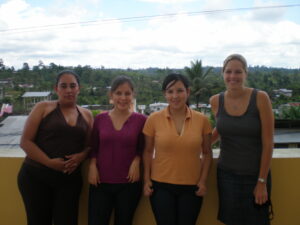
2024 Fall News
In 2010, I spent some time at our hospital in Pedro Vicente Maldonado (PVM), the only one we had at the time. The hospital administrator told me she needed to take a trip to the coast for a meeting at a public hospital. Would I like to come along? We arrived at a rundown clinic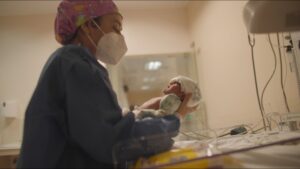
Summer News 2024
Since 2000, we’ve maintained a fully functional hospital in Pedro Vicente Maldonado (PVM), Ecuador. When we began, folks in the community had little access to health care and no access to hospital care. There were no government hospitals or private, for-profit hospitals. Basic equipment like X-rays or nebulizer machines, like many of you have used for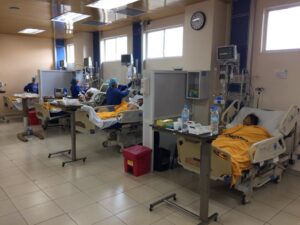
Spring News 2024
55-year-old Marta has chronic kidney disease related to diabetes and hypertension. She has received hemodialysis a few times a week for the past year but missed a week of dialysis. Short of breath, she went to one of Ecuador’s public health centers outside of the small, coastal town of Quevedo.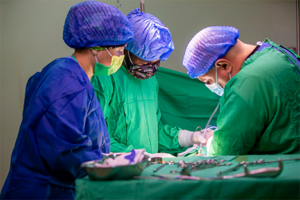
Winter 2023 News
Having been “in the field” now for more than 25 years, Andean Health & Development (AHD) has seen a very interesting and positive evolution of the “small hospital” and how it connects with primary health care services in the community.
Fall 2023 News
In addition to patient care and training, AHD commits some of its resources to research activities. You might be asking yourself, “why would AHD conduct research endeavors in Ecuador when those resources could be used to address the great unmet need for medical care right now?” It’s a fair question that deserves careful consideration.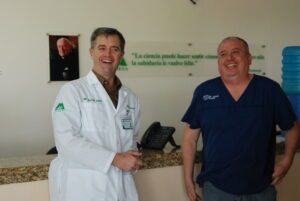
Spring 2023 News
How can a hospital – with all its complex patient care flows, inventories, purchasing, billing, and production monitoring – do it all in an effective, meaningful way, while making sure every dollar is spent wisely? This is a challenge faced by virtually all hospitals.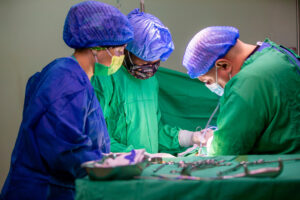
Winter 2022 News
Medicine is constantly evolving. As we gain knowledge and learn new skills, patient care improves. That’s why professional academies and hospitals in the U.S. provide—and demand—regular professional development.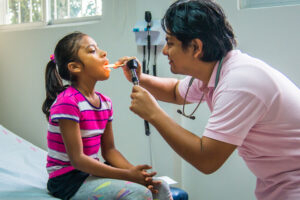
Fall 2022 News
More than 25 years have passed since Andean Health & Development began. Like any organization, it has faced multiple challenges: human, financial, social and even political.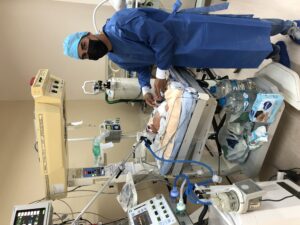
Spring 2022 News
We had a census of 50 hospitalized patients at Hesburgh Hospital in February: a new milestone. Where did they come from? Most came from Ecuador’s ministry of public health and social security systems.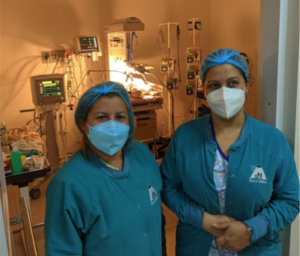
Winter 2021 News
COVID-19 has forced so many changes in the world, and AHD is no exception. The pandemic significantly changed the patient mix at our hospitals, had a substantial impact on our staff, and generally has exhausted everyone. It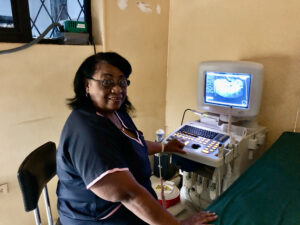
Fall 2021 News
Humans aren’t the only ones who get fatigued with age. Over time, medical equipment grows weary as well. Our two hospitals are equipped with medical equipment we received, in some cases, almost 20 years ago, and it was used before it got to us.
Summer 2021 News
While conditions surrounding the pandemic in the U.S. appear more encouraging with each passing day, the same cannot be said about Ecuador and many other low-income countries. Latin America has been hit disproportionately hard compared to other regions of the world. During the past two months, public hospitals have once again filled to capacity,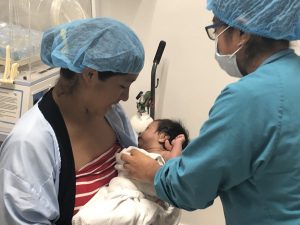
Spring 2021 News
The pandemic has revealed much about healthcare systems, health inequalities, and social determinants of health, such as poverty, geography, language, culture, education and employment. While tragic, many of these issues come as no surprise. In Ecuador, it appears that some of our hardest hit populations have been poor, undereducated, non-Spanish-speaking indigenous communities in the countryside.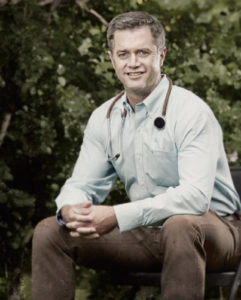
An Article by David Gaus
The Laboratory and the Real World In the fall of 1987, I was on my way to my first day of parasitology lab when I ran into a Zahm Hall freshman who asked where I was going. When I told him, he said, “Parasitology? Is that the study of how bugs think?” I thought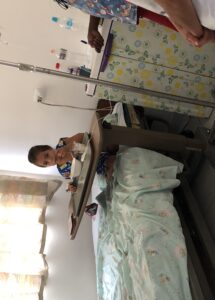
Winter 2020 News
Is the worst of COVID-19 behind us? We would all like to believe that it is. Vaccine candidates are close to distribution, and there are some treatments that hold promise. But numbers continue to rise at an alarming rate in the US, and hospitals are once again filling beyond capacity. Read Winter 2020 News Here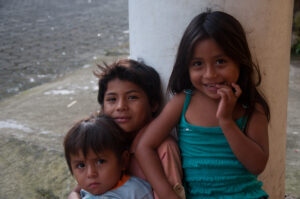
Fall 2020 News
From the Field The challenges of COVID faced by poor communities in Ecuador seem worlds apart from those in the United States. So many people here live hand to mouth and simply can’t afford not to work. And most jobs put them face to face with many people, continuously exposing them to the virus. The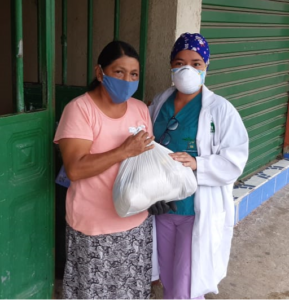
Summer 2020 News
From the FieldAs in the U.S., life has changed considerably in Ecuador since the Coronavirus pandemic hit. In this newsletter, we hope to give you a better idea of what has happened here, tell some patient stories to illustrate the challenges, and explain our response as a regional health care provider within the broader Ecuadorian context.
While watching events unfold in the U.S., we are struck by both the similarities and the differences in the political, medical, and the community’s response to the pandemic between these two countries.
READ THE SUMMER NEWSLETTER HERE
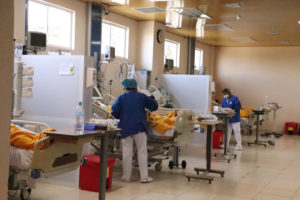
Spring 2020 News
From the FieldAre hospitals good for the health of our communities? At first glance, you might say, “of course!” But peel off a few layers and you might find some sticky questions. Why do hospitals and hospital procedures cost so much? Does the health benefit they provide justify the cost, especially when compared to other health interventions outside of the hospital? As just one example, how does the impact of a $15,000 heart bypass surgery compare to 15,000 vaccinations at $1 each? Likewise, we often wonder why so many health dollars are spent near the end of life for sometimes seemingly needless interventions, when less costly and often more humane palliative or hospice care options are readily available...
READ THE SPRING NEWSLETTER HERE
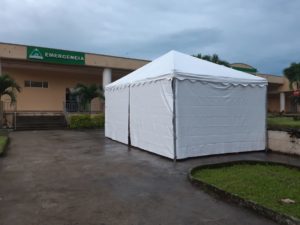
Coronavirus Update
March 26, 2020Ecuador has the most cases in South America behind Brazil. There are 1,211 confirmed cases today, and that is with limited testing available. AHD's hospitals are prepared to receive the Ministry of Health's overflow patients any day now.
March 23, 2020
Dear AHD Family,
Ecuador is suffering. The Minister of Health just resigned, and as of today, no additional public funding has been budgeted for this epidemic. Frankly, I'm stunned at their complete lack of response regarding resources and funding given that we're on lockdown and our borders are closing. The number of cases double daily down here, and that's only what we know from limited testing capability. The public sector will soon be overwhelmed. Our medical staff is prepared, and we have protocols in place. We recognize there is suffering everywhere around the globe, but please keep Ecuador in your thoughts. We have started a COVID-19 emergency fund for these underserved people. Please consider donating.
David
March 12, 2020
Coronavirus is here in Ecuador. Given the community transmission that we've seen in other countries, there is a high probability that it will spread fast in a low-resource setting like Ecuador. Handwashing and hygiene in Ecuador are not nearly at the level of the United States.
We are preparing ourselves to collaborate with the federal government and social security system to help manage patients in our catchment areas. When this becomes a major public health problem, the public system will collapse quickly. We have set up a tent outside our hospital to triage patients as to keep them separated from the other patients in the lobbies and waiting rooms. We have protocols in place for our medical professionals.
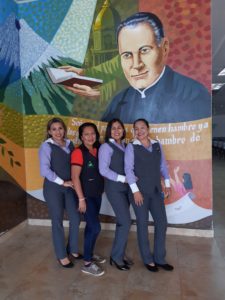
Winter 2019 News
Empowering Women Everyday: Didn’t you notice?A donor came to Ecuador a while back to see our hospitals and clinics in action. As with many of our visitors, she was duly impressed. But she added, “David, you never told me how many women you have working here. This is incredible!” We have had so many women working here for such a long time that I never stopped to think about how that might look to a visitor...

Hesburgh Film
AHD will be one of two recipients of any profits from the new documentary Hesburgh. The film offers a unique glimpse at US history as seen through the eyes of the long-time president of Notre Dame. Educator, civil rights champion, advisor to presidents, envoy to popes, theologian and activist, Fr. Hesburgh was called on by countless world leaders to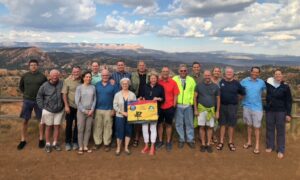
2019 Andean Health Bike Ride
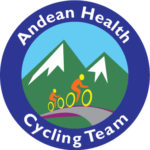
For eight years, a group of people who are passionate about the humanitarian work of Andean Heath have gotten together annually to learn of the progress of AHD’s work in Ecuador while doing something that they love: cycling!
This year the group ventures to Crater Lake and the Oregon Cascades to ride some spectacular routes, all the while helping raise money and awareness for Hesburgh Hospital in Santo Domingo, Ecuador. Please visit our Donate page to support the campaign of one of these riders! All donations go straight to our programs at Hesburgh Hospital. Thank you!
2019 Riders: Greg Allen, Jane Allen, Mike Allen, Hahns Burg, Dave Cutler, Lisa Cutler-Stamm, Laura Dries, Jim Dunn, Pat English, Rachel English, David Gaus, Alan Gianotti, Mike Heisler, Judy Jesiolowski, Phil Kalamaros, Mike Roemer, Tom Rolfs, Amy Rudolf, John Rudolf, Matt Rudolf, Nancy Rudolf, David Stein, David Thompson, and Mike Whyte
Select Bike Ride under "Special Designation" and enter the rider's name under "Comments," or send a check with the rider's name in the memo to Andean Health, 1100 Delaplaine Ct., Madison, 53715. Thank you!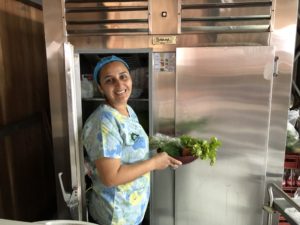
Spring 2019 News
You may have heard people speak of social determinants of health. These include poverty, poor education, political disenfranchisement, and being a member of a cultural or ethnic minority. Another one is war. I would like to tell you about a patient I saw in clinic early this year. Eduardo is a 51 year-old man who transported vegetables in big trucks along the Ecuador-Colombia border. He was kidnapped about 5 years ago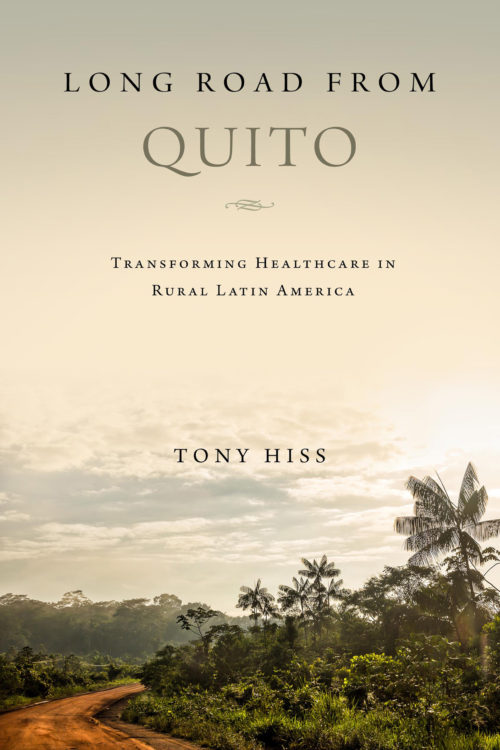
Book about AHD Launched
Long Road from Quito, a book about the inspiring journey of Dr. David Gaus and Andean Health & Development is written by Tony Hiss. Hiss is the author of 13 books and was a staff writer at the New Yorker for 30 years.
Check out a review by the American Journal of Tropical Medicine & Hygiene
Listen to an interview with Dr. David Gaus and author Tony Hiss on Wisconsin Public Radio
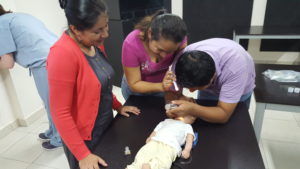
Winter 2018 News
A critical part of our mission is training Ecuador’s future health leaders. The AHD Family Medicine resident training program truly sets us apart, and I’m so proud to welcome our newest residents: each one Ecuadorian, seven in all. We developed our program to focus on four key disciplines. First, we teach them...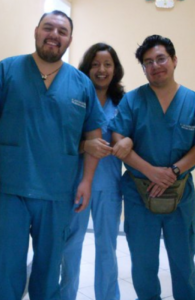
Fall 2018 News
Many considered financial self-sustainability for a poor rural hospital an impossibility, but our first hospital in Pedro Vicente Maldonado (PVM) achieved that goal in 2007. It certainly wasn’t easy. We experimented with all sorts of revenue generating ideas to keep the hospital running, and most failed. One combination of financing mechanisms finally did work: a public-private partnership with Ecuador’s national social security system. Social security pays us for the patients in their system, and we charge other patients who are able to pay very reasonable prices. Although that public relationship has many challenges, it catalyzed our successful journey to 100% financial self-sustainability. To this day...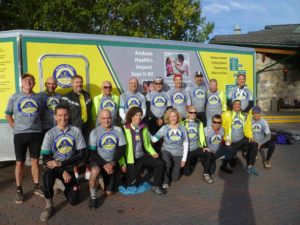
2018 Andean Health Bike Ride
18 intrepid cyclists will ride either 4 or 7 days through Zion National Park July 7-13 to raise funds and awareness for Andean Health & Development. Here is what the riders of the Andean Health Cycling Team have accomplished over the past seven years:~ 43,284 miles covered
~ 7 years, 15 states or provinces traversed
~ $1,565,570 raised
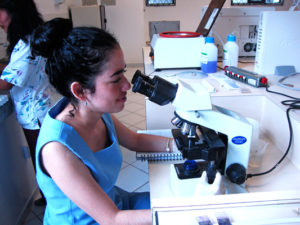
Spring 2018 News
A Chinese immigrant carried his daughter into Hesburgh Hospital’s Emergency Room in mid-January. She had some cognitive delays and severe scoliosis, and now she was suffering extreme respiratory difficulty. We diagnosed influenza with pneumonia as a complication. She went downhill very fast and sadly died in the ICU within two hours of coming to the ER. Influenza is a concerning public health threat in the U.S., as you all know. It is generally a wintertime virus due, in part, to the concentration of people in warm, enclosed areas. Because the southern hemisphere’s winter falls during the U.S.’s summertime...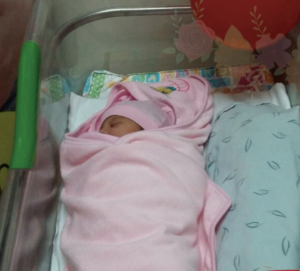
Breakthrough Maternal/Child Health Grant from Ronald McDonald House Charities
As you all know, we’ve spent two decades working to improve medical care for Ecuador’s rural poor. And recently, this work and commitment earned a $1.5 million grant from Ronald McDonald House Charities® (RMHC®). This remarkable award validates the hard work of everyone in this organization, specifically because Andean Health is one of only four organizations to receive one of these prized global grants. This grant will help us specifically address maternal and newborn health services in Santo Domingo and the surrounding provinces.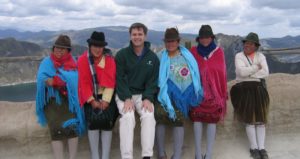
An article by the Notre Dame Alumni Association
As a senior, David Gaus ’84 had a crisis moment when he realized he didn’t want to be an accountant. So he did what any sensible Notre Dame student would do, and scheduled a meeting with Rev. Theodore M. Hesburgh, C.S.C., the University’s president. It led to a service opportunity in Ecuador and ultimately put him on the path to where he is today: training self-sufficient physicians to serve patients in rural communities across the country...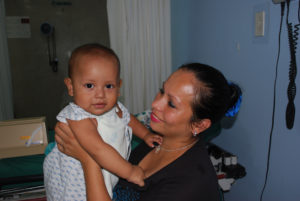
Winter 2017 News
Ligia delivered her magnificent, nine-pound baby boy in early November. Big babies with wide shoulders sometimes get stuck above mom’s pelvic bone and need special, rapid maneuvers from the medical team to complete the journey out – her baby was no exception to the rule, but did just fine. Then mom’s uterus did not contract. When that happens, heavy bleeding can rapidly ensue. Massages and medications frequently alleviate this, but not always. This time, nothing worked. We took Ligia to the emergency room to try to control the bleeding. Her blood pressure was lower than anything I had ever witnessed; she ultimately required an emergency hysterectomy (removal of the uterus) to save her life...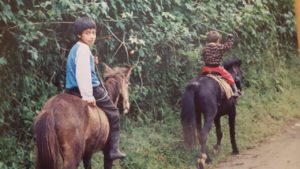
A 20-Year Journey
As Andean Health & Development celebrates 20 years of high quality health care to the poorest of the poor in rural Ecuador, we invite you to take a look back.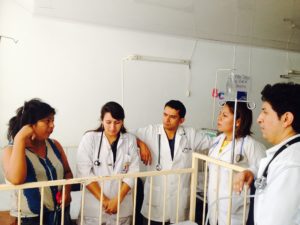
Fall 2017 News
We ran into three recent graduates of our residency program who are all now working at that MOH hospital. They said that when they started at the MOH hospital, they quickly noticed the low quality of inpatient care (hospitalized patients) due to so few doctors having proper training. In response, these newly minted doctors proposed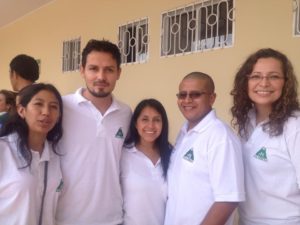
AHD in the News
Notre Dame Magazine, 1999, “The Road to Pedro Vicente” Global Health-Tulane Magazine Article, 2008, “Building a Hospital in Rural Ecuador” Milwaukee Magazine, 2008, “The Picture of Health” Think Spanish! Magazine, 2009, “Entrevista a Laura Dries” Notre Dame Magazine, 2010, “From Mountaintop to Global Health” The Hospitalist, 2010, “Hospitalist in the Developing World” Milwaukee Journal Sentinel,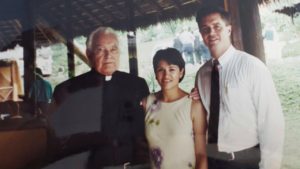
Father Ted's 100th Bday
Today would have been Rev. Theodore Hesburgh’s 100th birthday. Most of you know of Fr. Ted’s considerable impact on American civil rights and immigration, his counsel to Presidents and Popes, and his commitment to Catholic higher education. I’d like to share his impact on this small corner of the planet here in the Andes Mountains…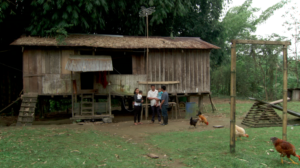
Spring 2017 News
Mosquitoes are a real problem for people in tropical climates all over the world, including the region we serve in tropical Ecuador. They come in many different brands, shapes and sizes.